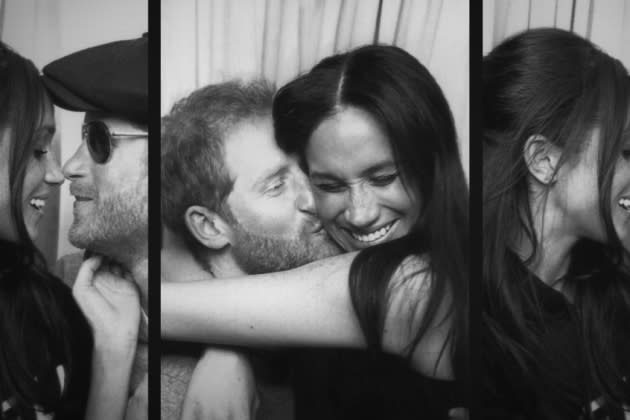‘Harry & Meghan’ Composer Gil Talmi Explains How the Score Enhances Themes of ‘Compassion, Fear, Systemic and Social Issues’

Netflix’s six-part docu-series “Harry & Meghan” puts the Duke and Duchess of Sussex at the center of their story.
The limited series details the couple’s relationship, from their first impressions of one another to the growth of their family. However, throughout the six hours, composer Gil Talmi revealed to Variety, he composed over four hours (approximately 260 minutes) of music to embrace the regal and historical elements of the Duke’s past and current challenges.
More from Variety
Prince Harry and Meghan Markle Labeled 'F-ing Grifters' by Spotify Exec Bill Simmons After Deal Ends
“Naturally, the subject of the royalty and the monarchy lends itself to the classical background, with a lot of neoclassical piano, strings and orchestra.” The composer detailed how he combined the Duke’s past and present through the incorporation of darker electronics and modular and analog synths, all in an effort “to help convey the challenges and darker undercurrents that [Harry and Meghan] have been facing.”
Talmi’s research extended further than the subjects themselves, the composer immersed himself in the music history of the story’s regions and time periods. “There’s a lot of research that goes into it for me from the perspective of being an authentic voice to an authentic story.”
Talmi continued, “For documentaries, we, as composers, are there, to tell the truth. So [the research] starts with [asking], ‘Sonically, what is the truth?’ I want to make sure that I’m not sonically colonizing. That I know the instruments, the region, the instrumentation, and as much as possible I can hire musicians from this specific place to make it really, really authentic.”
As Talmi concluded his research, he turned to the series director Liz Garbus, supervising editor Erin Barnett and executive producer Erica Sashin, to develop the series’ thematic cues. Instead of composing music for “characters,” Talmi clarified that he created themes that align with the series’ messaging, developing music that encompasses the series’ depiction of “compassion, fear and systemic and social issues.”
Beyond creating individual cues that delineate characters Talmi continued, “I’m interested in, ‘what are universal themes that carry through compassion, fear, systemic issues, social issues?’ To have those broad brushstroke approaches (and musical themes) I think becomes this glue that lends itself very well. Especially when we’re talking about six hours of filmmaking.”
Talmi was also informed by his personal upbringing. “I grew up on classical music and that’s just in my DNA. It’s not every day that you get a project where you get to bring all of that into it.” He adds, “I did have the influence of the great classical, romantic and baroque composers. In one of my main themes, there’s a lot of baroque influence as far as chord progressions. It’s so easy to score something from the dramatic perspective of what’s happening now, but I think there’s something about respecting something like a monarchy that’s been around for hundreds of years.”
Talmi noted his five favorite cues that enhanced these themes were the title sequence, “We Know the Truth,” “The Gilded Cage,” “Shifting the Balance,” and “An Untimely Death.” But Talmi said that throughout “We Know the Truth,” he wanted to convey “the timelessness of the story, the intimacy, the poignancy, the struggle, and bittersweetness,” through the implementation of a neoclassical piano solo.
“There’s something about piano that can be so elegant and so timeless and so rich without the size of the orchestra. As documentary film composers, we want to allow the audience to formulate their own opinion. So if we go in with this larger than life sound, we can inadvertently push the audience away rather than inviting them in. Because this is all about staying in the questions, not giving all the answers.
“I love playing with major minor modalities – I did that in the Great Hack a lot – and space. It’s not just about the notes, it’s the space between the notes, right? So it’s all about creating this tapestry that allows the audience to be like, ‘Wow, okay. I’m into this. I’m interested, I want to go deeper.'”
Throughout “An Untimely Death,” Talmi focused on abiding by the standard composition of documentaries, by creating “a lot of space and pausing,” through the major and minor modalities. “Oftentimes in a narrative film, the music is pushing ahead to unfold, and in documentary scoring, we wait,” explained Talmi.
“In this case [of ‘An Untimely Death’], and oftentimes, what I find very effective in documentary films is actually for music not to hit. So if there’s a major event or a cut happening rather than hitting it with music, actually allowing the music to come out.” Talmi explained how he tries to compose the music around a specific visual cue, because “it creates this dance between imagery and music, that is very respectful and not pushy.”
All six episodes of “Harry & Meghan” are available to stream on Netflix.
This interview has been edited and condensed.
Best of Variety
Sign up for Variety’s Newsletter. For the latest news, follow us on Facebook, Twitter, and Instagram.

 Yahoo News
Yahoo News 